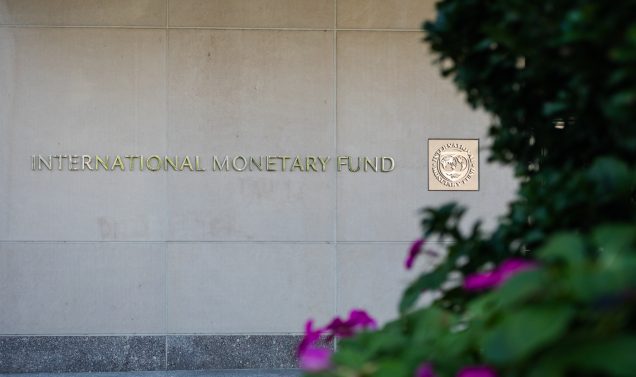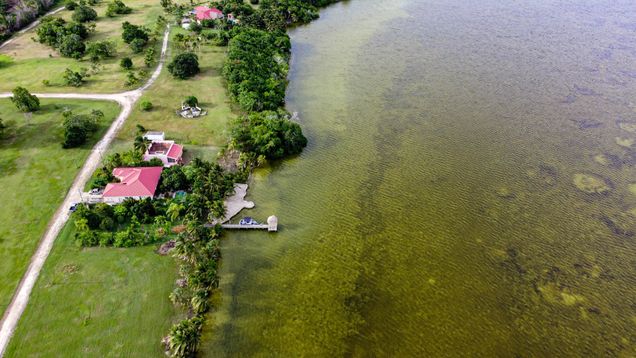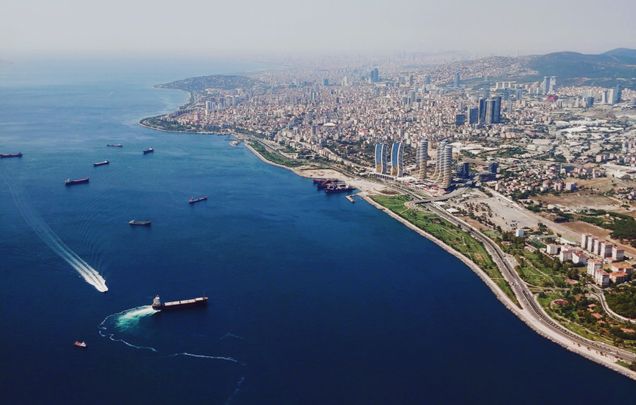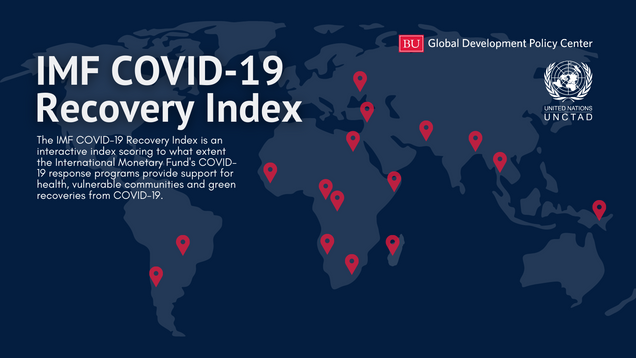GDP Center Roundup – IMF/World Bank Group Annual Meetings, 2022

By Amanda Brown
The international system is at a crossroads, facing increasingly global challenges and struggling to meet the needs of all countries amid rising levels of unsustainable debt and climate disasters.
Against this backdrop, the IMF and World Bank kick off their Annual Meetings in Washington, D.C. from October 10-16, 2022. As these institutions convene with policymakers, civil society and researchers from around the world, the Boston University Global Development Policy Center has produced a suite of research to understand the overlapping crises of debt, climate and COVID-19 and how the IMF is uniquely positioned to support developing countries and global financial stability. This includes research from the Task Force on Climate, Development and the IMF, a consortium of experts from around the world utilizing rigorous, empirical research to advance a development-centered approach to climate change at the IMF.
See highlights from the latest research below.
No Voice for the Vulnerable: Climate Change and the Need for Quota Reform at the IMF

In 2021, the IMF committed to incorporate climate-related issues into its operations and is in the process of developing frameworks and policies. The IMF’s governance structure will impact the decision-making process on how these frameworks will be developed, with a quota system based on countries’ economic share determining formal voting power.
A new working paper from Lara Merling illuminates how decision-making power is distributed within the IMF, as well as the implications of the quota share on the IMF’s lending practices, fee structures and distribution of newly allocated reserves. The paper finds climate vulnerable countries have negligible formal decision-making power over how the IMF frames its policies around climate.
The current quota review is a timely opportunity for countries such as the US, or other members of the G7 who have stated their commitment to multilateralism, to prove they can deliver on a system that is both accountable to and meets the needs of all members. Read the working paper.
Meeting the Moment: The IMF, Debt-For-Climate Swaps and Development

In August 2022, IMF economists released a working paper on debt-for-climate swaps that weighs the various types of debt-for-climate linkages that have been proposed and implemented by these various actors.
In response, a new policy brief from the Task Force on Climate, Development and the IMF evaluates some of the areas outlined in this paper and highlights how the IMF can build on it to advance a comprehensive instrument.
The Task Force welcomes the IMF’s recognition of a link between debt pressures and the climate crisis. They also concur with IMF staff on two key points. First, overall debt restructuring is more favorable to a debt swap. Second, a debt swap can be useful in certain cases, namely when the climate investment in the swap is less than the overall haircut to a creditor and subsequent climate investments are senior to payments disbursed to other creditors. However, the Task Force is concerned that research from IMF staff on this topic falls short on acknowledging the urgency of addressing climate change. Read the policy brief.
Climate Change Risks and Consequences on Growth and Debt Sustainability in Africa

Although Africa has contributed only 3.8 percent of total global emissions, it has borne the brunt of climate change. With a substantial lack of energy access in Sub-Saharan Africa, the continent must balance the need to combat climate change with an urgency to develop the continent’s economies to alleviate hunger and poverty, which are exacerbated by the impacts of climate shocks on agriculture.
A new technical paper from researchers at the African Economic Research Consortium and the African Center for Economic Transformation explores the effects of climate change on growth, debt and sectoral output in Africa.
The authors find that an increase in temperatures could result in a decline in real gross domestic product (GDP) in African countries, thus worsening the debt burden due to climate change induced shocks. Incorporating climate change risk into macroeconomic management, policies and tools of African governments is critical. The paper also recommends building capacity and expertise to participate in carbon pricing and international carbon markets. Read the technical paper
Climate Physical Risk, Transition Spillovers and Fiscal Stability: An Application to Barbados

Beyond climate physical risks, countries can also be negatively affected by a disorderly introduction of climate policies and regulations, known as transition risks. In particular, countries in the Caribbean region, and among them Barbados, are a good example of climate risk exposure and vulnerability as well as challenges to accessing and deploying climate finance.
A new technical paper from Régis Gourdel and Irene Monasterolo for the Task Force on Climate, Development and the International Monetary Fund assesses the macroeconomic, public finance and sovereign risk implications of both physical climate risks and transition spillover risks in Barbados.
Barbados faces a potentially significant reduction in GDP due to transition spillover risk. Implementing domestic climate policies may decrease GHG emissions by up to 75 percent, with economic costs smaller than that of unabated climate change. In response, the authors suggest that climate policies should be implemented early while actively planning for potential disruptions of the tourism revenues. Read the technical paper.
Critical Challenges in Realizing the Energy Transition: An Overview of Indian States

Over the next few decades, India will undergo a significant energy transition to meet climate goals, with a steady reduction in the share of fossil fuels in its energy portfolio. This transition will have many different impacts, including on government revenues, investments and potential loss of fossil fuel-based assets and employment. Moreover, the transition will happen across districts, cities and states and impact each differently.
A new technical paper from researchers at the Centre for Social and Economic Progress (CSEP) examines three key challenges that State governments in India will face during the transition away from a fossil-fuel driven economy. The authors estimate the current dependence on fossil fuels by way of State government revenues, ownership of coal power units as well as those employed by coal mining.
Overall, they find that the transition process will not be a linear, top-down process driven only by the Central government in India. Instead, it will require a series of actions at the Central government level, coordinated with State governments, in consonance with India’s power regulatory set-up and constitution. Read the technical paper.
An Analysis of the IMF’s International Carbon Price Floor Proposal

With the goal of enhancing global climate action, the International Monetary Fund (IMF) has proposed an international carbon price floor (ICPF) arrangement, developed from the global carbon price and designed to complement existing policy regimes by focusing on price floors, rather than price levels.
A new technical paper from Ma Jun, He Xiaobei and Zhai Fun for the Task Force on Climate, Development and the IMF conducts an analysis of the burden-sharing effects of an ICPF arrangement, finding that, while the ICPF may be an efficient and effective means of reducing emissions, it would place additional responsibilities of emissions reductions, as well as additional economic costs, on developing countries.
While an ICPF arrangement, even for just six large emitters, can be an efficient and effective approach to scale up action on climate mitigation globally, the design of the IMF’s ICPF must be improved to incentivize participation from low- and middle-income countries. Without this consideration, it is unlikely that the ICPF would be accepted by many developing countries in practice, and given the potential abatement impact, it is essential that China and India participate in any ICPF arrangement. Read the technical paper.
The Global Financial Safety Net Tracker
![]() What is the annual lending capacity of the IMF and how much financing have countries been able to access since the onset of the COVID-19 economic crisis? Updated with new data through July 2022 and developed in partnership with Freie Universitat, Berlin and the United National Conference on Trade and Development, the Global Financial Safety Net Tracker tracks the annual lending capacity of the IMF, central banks and regional financial arrangements (RFAs), as well as the total amount of financing allotted to combat the COVID-19 crisis via loans from the IMF, RFAs and currency swaps to date. Explore the data.
What is the annual lending capacity of the IMF and how much financing have countries been able to access since the onset of the COVID-19 economic crisis? Updated with new data through July 2022 and developed in partnership with Freie Universitat, Berlin and the United National Conference on Trade and Development, the Global Financial Safety Net Tracker tracks the annual lending capacity of the IMF, central banks and regional financial arrangements (RFAs), as well as the total amount of financing allotted to combat the COVID-19 crisis via loans from the IMF, RFAs and currency swaps to date. Explore the data.
The IMF COVID-19 Recovery Index
 The interactive IMF COVID-19 Recovery Index allows users to explore to what extent the financial assistance programs initiated by the IMF since the start of COVID-19 help borrower countries combat the virus, support the vulnerable and promote a green and inclusive recovery from COVID-19.
The interactive IMF COVID-19 Recovery Index allows users to explore to what extent the financial assistance programs initiated by the IMF since the start of COVID-19 help borrower countries combat the virus, support the vulnerable and promote a green and inclusive recovery from COVID-19.
Assigning the programs scores ranging from 0-3, the Index shows that, among the 75 program started since March 2020, the IMF has paid significant attention to supporting health and vulnerable communities, but support for financing green recoveries is lagging. Explore the data.
All Hands on Deck? Ensuring Crisis Response Capacity at the IMF/World Bank Group Annual Meetings

In a new blog highlighting the updates to two of our data interactives, William N. Kring outlines how the IMF/World Bank Annual Meetings represent possibly the last opportunity to prepare for the coming storm. There are three areas in which progress is urgently needed to avert a catastrophic global recession. First, comprehensive debt restructuring is necessary across all creditor classes for emerging market and developing economies. Second, while the resources available as part of the Global Financial Safety Net (GFSN) for crisis prevention and liquidity support via emergency financing institutions and arrangements has increased to more than $3.5 trillion over the last decade, recent research finds that the GFSN has been scarcely utilized throughout the COVID-19 crisis. Finally, the IMF needs to be better resourced to respond to the looming debt crisis. Read the blog.
*
Never miss an update: Subscribe to the Global Economic Governance Newsletter